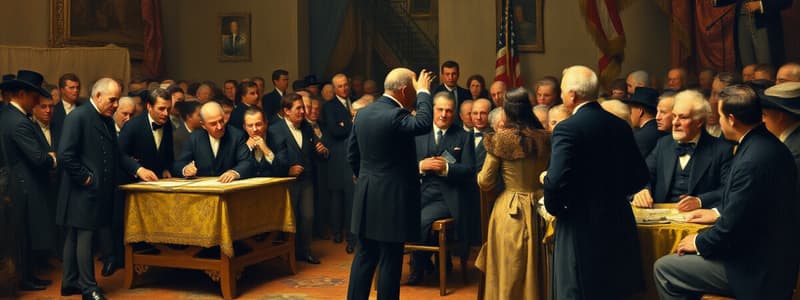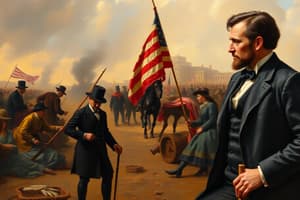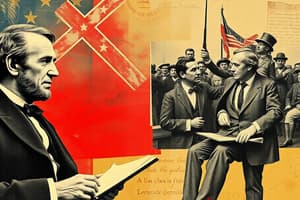Podcast
Questions and Answers
What did southern Democrats insist on during the Democratic national convention in Charleston?
What did southern Democrats insist on during the Democratic national convention in Charleston?
- A plank favoring immigration reform
- A plank supporting popular sovereignty
- A plank favoring a federal slave code for the territories (correct)
- A plank for abolition of slavery
Stephen A. Douglas had the support of a two-thirds majority of delegates at the Democratic convention.
Stephen A. Douglas had the support of a two-thirds majority of delegates at the Democratic convention.
False (B)
Who were two prominent secessionists mentioned in the text?
Who were two prominent secessionists mentioned in the text?
William L. Yancey and Edmund Ruffin
Which candidate was nominated for president by the Southern Rights Democratic Party?
Which candidate was nominated for president by the Southern Rights Democratic Party?
Which party was founded by a coalition of former southern Whigs and northern Whigs?
Which party was founded by a coalition of former southern Whigs and northern Whigs?
The Republican Party expected to win electoral votes from all fifteen slave states in the election of 1860.
The Republican Party expected to win electoral votes from all fifteen slave states in the election of 1860.
Who was the leading presidential prospect for the Republican Party before Abraham Lincoln emerged?
Who was the leading presidential prospect for the Republican Party before Abraham Lincoln emerged?
What significant speech did Abraham Lincoln give that conveyed a similar message to Seward's 'Irrepressible Conflict' speech?
What significant speech did Abraham Lincoln give that conveyed a similar message to Seward's 'Irrepressible Conflict' speech?
Flashcards are hidden until you start studying
Study Notes
The Election of 1860 Overview
- Charleston, South Carolina, became a divisive site for the Democratic National Convention amid Southern-rights radicalism.
- The Democratic Party required a two-thirds majority for a presidential nomination, which gave Southerners significant influence.
- Stephen A. Douglas had majority delegate support but faced opposition from Southern Democrats due to his stance against the Lecompton constitution and federal slave codes.
Convention Dynamics
- Southern delegates demanded a platform plank for a federal slave code but failed to impose it by a slim majority.
- The rejection of the pro-slavery plank led to the walkout of fifty Southern delegates.
- Following the walkout, Douglas and other candidates failed to gain the necessary two-thirds majority, leading to a stalemate and adjournment after 57 ballots.
Emergence of Secessionist Sentiment
- Pro-slavery radicals like William L. Yancey and Edmund Ruffin believed a Northern president would catalyze Southern secession.
- Yancey energized crowds with his calls for an "Independent Southern Republic" after walking out of the convention.
Baltimore Convention and Formation of New Parties
- The second convention in Baltimore mirrored the Charleston event with more Southern delegates walking out.
- The Southern delegates formed the Southern Rights Democratic Party and nominated John C. Breckinridge on a slave-code platform.
- The regular Democrats nominated Douglas, setting the stage for a complex four-party election.
Constitutional Union Party
- A coalition of former Southern Whigs and Northern Whigs created the Constitutional Union Party, nominating John Bell of Tennessee.
- Bell's candidacy aimed to exert conservative influence amid increasing polarization but had little chance of winning.
Republican Strategy and Lincoln's Nomination
- The Republican Party sought to capitalize on the Democratic split, aiming for its first presidential election victory.
- The party anticipated no electoral support from slave states but targeted crucial Northern swing states like Pennsylvania, Illinois, and Indiana.
- William H. Seward was the initial front-runner for the Republican nomination but faced opposition due to his radical reputation and past policies.
- Abraham Lincoln emerged as a more appealing candidate for delegates; he opposed nativism less publicly and maintained a moderate stance appealing to vital voters.
Studying That Suits You
Use AI to generate personalized quizzes and flashcards to suit your learning preferences.




